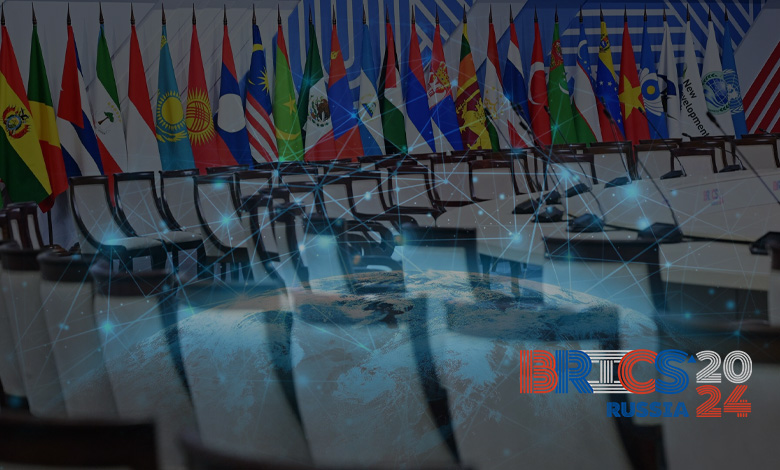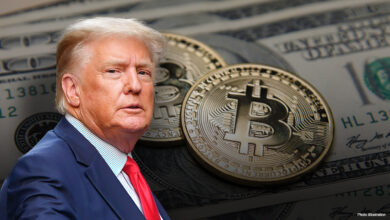BRICS Push for De-Dollarization: Putin Advocates for a New Financial Order Amid Global Tensions

The recent BRICS summit in Kazan has unveiled a pivotal moment in the global economic landscape, as Vladimir Putin calls for an alternative international payment system to diminish the U.S. dollar’s influence. As he stated, “The dollar is being used as a weapon,” emphasizing the urgent need for a financial framework that can shield nations from the political leverage exercised through dollar dominance. This call comes amid rising global tensions and a pressing desire among BRICS nations—comprising Brazil, Russia, India, China, and South Africa—to establish a multipolar world that reduces reliance on traditional financial systems like SWIFT.
Blockchain Technology: A Path to Financial Independence
As BRICS countries explore alternatives to existing financial frameworks, discussions around a potential BRICS currency, possibly gold-backed or blockchain-based, hint at a revolutionary shift in global finance. The emergence of blockchain technology as a foundational element in these initiatives signifies a move towards greater transparency and security in transactions. With BRICS nations representing over 40% of the world’s population and 25% of the global economy, their collective push for innovative financial solutions poses a formidable challenge to the current economic order.
U.S. Economic Landscape: A Growing Burden
The U.S. economy is currently grappling with unprecedented levels of national debt, which surged by $473 billion in just three weeks to reach a staggering $35.8 trillion. This translates to $1,450 of debt for every American in that same period, The Kobeissi Letter posted on X. In 2024, the US paid a total of $1.16 trillion of interest on this debt in its first year above the $1 trillion mark.
The implications of this debt crisis are significant, leading to warnings about potential economic instability. As JPMorgan Chase CEO Jamie Dimon noted, the geopolitical landscape is fraught with challenges, including large fiscal deficits and threats from an “evil axis” comprising Iran, North Korea, and Russia.
The Expanding BRICS Bloc: A Shift in Global Power
At the heart of the recent BRICS discussions is the growing interest of numerous countries in joining the bloc, signaling its rising geopolitical and economic significance. Among the 13 nations expressing interest in becoming part of BRICS, Turkey’s formal request to join has attracted attention. Turkish President Recep Tayyip Erdoğan’s presence at the 16th BRICS Summit underscores Turkey’s strategic move to align with the BRICS agenda.
Turkey’s recent enactment of comprehensive crypto-asset regulations further positions it as a leader in this space. Turkey’s inclusion, alongside nations like the UAE, would strengthen BRICS’s efforts to challenge the Western financial systems and lead innovations in the crypto and digital asset sphere.
Putin’s Goals: Redefining Economic Cooperation
Putin’s agenda at the summit centers around fostering economic cooperation beyond the constraints imposed by the dollar. He highlighted Russia’s ongoing efforts to develop a settlement and payment infrastructure that could circumvent SWIFT, positioning Russia as a key player in this transformative process. His remarks underscore a vision for a self-sufficient economic ecosystem that leverages the strengths of BRICS members to create new pathways for trade and investment.
Concerns Among BRICS Members
The BRICS nations are increasingly united in their pursuit of de-dollarization, a strategic initiative aimed at reducing dependence on the U.S. dollar in international trade. This effort has garnered mixed reactions within the bloc, particularly from Brazil and India, who fear the bloc may lean too heavily toward pro-Chinese and anti-Western sentiments. These nations emphasize the importance of maintaining a diverse and cooperative alliance rather than one dominated by a single narrative.
Nonetheless, the discussions at the summit indicate a collective desire to explore local currencies for trade, with nearly 95% of trade between Russia and China now conducted in rubles and yuan. The interest in creating a new payment system is further driven by the desire to enhance trade partnerships and diminish the economic leverage of Western countries.
Iran’s Perspective on Western Influence
In this context, Iranian Ambassador Kazem Jalali has urged BRICS nations to establish a financial and banking system independent of Western standards, which he claims harm Global South countries. Speaking in Dubai ahead of the 16th BRICS Summit, Jalali argued that the existing Western financial system imposes regulations that benefit only Western countries at the expense of developing nations. He emphasized the opportunity for BRICS to create “fair standards” in financial cooperation that would not rely on biased Western frameworks.
Cryptocurrency: A Strategic Tool in Geopolitics
Amidst these discussions, the intersection of cryptocurrency with the geopolitical landscape has gained prominence. As Russia seeks to navigate Western sanctions, Bitcoin and other cryptocurrencies emerge as potential solutions for international trade. The idea of allowing Russian miners to sell Bitcoin to foreign consumers presents a novel approach to bypass traditional financial systems dominated by the dollar. This strategic pivot toward crypto is not merely an economic maneuver but a response to the urgent need for financial autonomy.
BitRiver, one of Russia’s largest mining companies, is partnering with the Russian Direct Investment Fund (RDIF) to establish Bitcoin mining and AI data centers across BRICS nations. This initiative aims to enhance liquidity in cross-border transactions while fostering technological advancements within the coalition. The regulatory framework for cryptocurrency mining has also evolved, with new laws in Russia facilitating the use of mined cryptocurrencies for international payments.
A New Financial Landscape?
The ongoing BRICS summit reflects a critical juncture in the evolution of international finance. As Putin’s calls for alternative payment systems resonate, the implications of these initiatives extend beyond mere currency alternatives; they signify a broader geopolitical shift towards a more balanced global financial system. Whether these efforts will foster cooperation or exacerbate tensions remains to be seen, but the drive towards de-dollarization and the embrace of cryptocurrency indicate that the financial future will be shaped by innovative approaches and new alliances.





